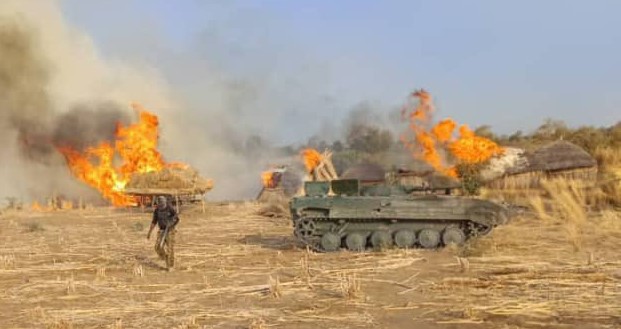File photo of troops engaging insurgents
BY OLUMAYOWA OLANIYI
In what can only be described as devastating, Nigeria’s security challenges reached a disturbing new escalation with the recent abduction and killing of the Brigadier General by Islamic State West Africa Province (ISWAP) and the kidnapping of 25 schoolgirls in Maga, Kebbi State.
These incidents are not isolated; they represent deep structural vulnerabilities in Nigeria’s national security architecture and the increasingly daring posture of violent non-state actors across the country.
The Abduction and killing of the Brigadier General
Advertisement
The capture and killing of the senior military officer by ISWAP marks one of the most audacious attacks on the nation’s military in recent years. While there are several conflicting accounts of this heinous act, this incident simply raises troubling strategic and operational questions.
For instance, how was the General isolated in the ambush from his men in an area long recognised as a high-risk corridor? Did the ambush completely overwhelm his convoy, or were there operational gaps in coordination, intelligence, and mobility support? These questions are not mere speculation; they go to the heart of force protection and the preparedness of units operating in unstable theatres.
Equally disturbing is the precision with which ISWAP executed the ambush. Was the group’s knowledge of the convoy’s movement a coincidence, or did it result from actionable intelligence, I mean, was it possibly through community informants, intercepted communication, or infiltration? If the latter is the case, this suggests a deeper intelligence compromise and a worrying expansion of ISWAP’s surveillance capabilities in the north-east.
Advertisement
This incident also raises a broader strategic concern: was the ambush a retaliatory strike? The Nigerian Air Force has recently intensified air bombardment of ISWAP positions amid their violent turf battles with Boko Haram factions around the Lake Chad Basin.
ISWAP may have interpreted the operations as a direct threat to their consolidation efforts, prompting a targeted, symbolic attack on the military to demonstrate resilience and undermine state authority. Such a high-profile attack sends a two-prong psychological message to the Armed Forces and to local communities. This signaling could be to intimidate anyone that ISWAP retains offensive initiative and capabilities.
This is the kind of incident that can recalibrate insurgent motivations, encourage recruitment, and embolden other violent actors if not addressed with a clear, decisive counter-operation.
Maga, Kebbi: another attack on girls, another reminder of targeted attacks
Advertisement
The kidnapping of 25 schoolgirls in Maga, Kebbi State reinforces the disturbing pattern of gendered violence driven by banditry in the north-west. Despite years of repeated attacks on schools, from Chibok to Yauri, Nigeria continues to struggle with securing educational facilities and hard-to-reach rural communities.
More critically, the incident exposes the futility of the “dialogue-and-negotiation” model adopted by several north-western governments in recent times. While some argue that negotiation temporarily reduces violence, the emerging reality suggests the opposite: bandits have used negotiations as an opportunity to regroup, extort communities, impose taxes, and consolidate territorial influence. This raises a critical question: Has negotiation become a tactical ceding of territory to bandits?
In many rural communities in Zamfara, Sokoto, Kebbi, and parts of Niger State, bandit groups operate with quasi-government authority—controlling movement, regulating farming, and imposing levies. Where negotiations exist without a credible enforcement mechanism, the result is a parallel governance system that displaces state authority and turns citizens into bargaining chips.
A fragile security architecture under siege
Advertisement
Nigeria’s deepening insecurity is reinforced by several structural weaknesses that demand urgent national attention. First is the persistent intelligence failure and infiltration risk, as insurgent and bandit groups increasingly rely on local informant networks and intercepted communications to anticipate and pre-empt military operations.
This challenge is exacerbated by the sustained proliferation of small arms and light weapons, which enables the rapid expansion and firepower of violent non-state actors across the country.
Advertisement
Compounding this is the rise of hybrid security initiatives like the vigilante group, the Civilian Joint Task Force (CJTF), and various community militias which, while filling critical security gaps, complicate command-and-control structures and raise long-term concerns for state sovereignty. Weak border governance further amplifies these threats, with porous frontiers in the Lake Chad Basin and north-west corridors serving as key supply routes for insurgent and bandit groups.
Finally, the recent killing and abduction of senior military officers underscore a troubling lack of force protection reform, highlighting the urgent need to strengthen operational protocols, convoy security, and strategic mobility within the Armed Forces.
Advertisement
The urgency of a coherent national response
Nigeria stands at a dangerous modulation point. The abduction and killing of the Brigadier General is more than a tactical or operational setback; it is a symbolic attack on the state’s coercive pillar.
Advertisement
The kidnapping of 25 schoolgirls underscores the perpetual vulnerability of rural populations. Together, they paint a picture of a nation where violent non-state actors continue to expand operational space while the state remains reactive. The story of the four lepers told in II Kings 7:3 comes to mind “…Why sit we here until we die?”. Nigeria cannot continue to react to these challenges but rather be offensive. Why sit here till we die?
Addressing Nigeria’s escalating security challenges requires a coherent, multi-layered national strategy that strengthens both state capacity and community resilience. At the core is the need for better interagency intelligence coordination to ensure timely information sharing and reduce operational vulnerabilities. More than ever, Nigeria needs a National Security Strategy (NSS) that responds to current security challenges with clear and decisive pathway to addressing these challenges.
Nigeria cannot continue responding to crises on a case-by-case basis. Without a decisive shift toward intelligence-driven, people-centered security governance, the country may witness deeper fragmentation, loss of public trust, and increasing militarisation of everyday life.
Olaniyi writes from Abuja and can reached via [email protected]
Views expressed by contributors are strictly personal and not of TheCable.
